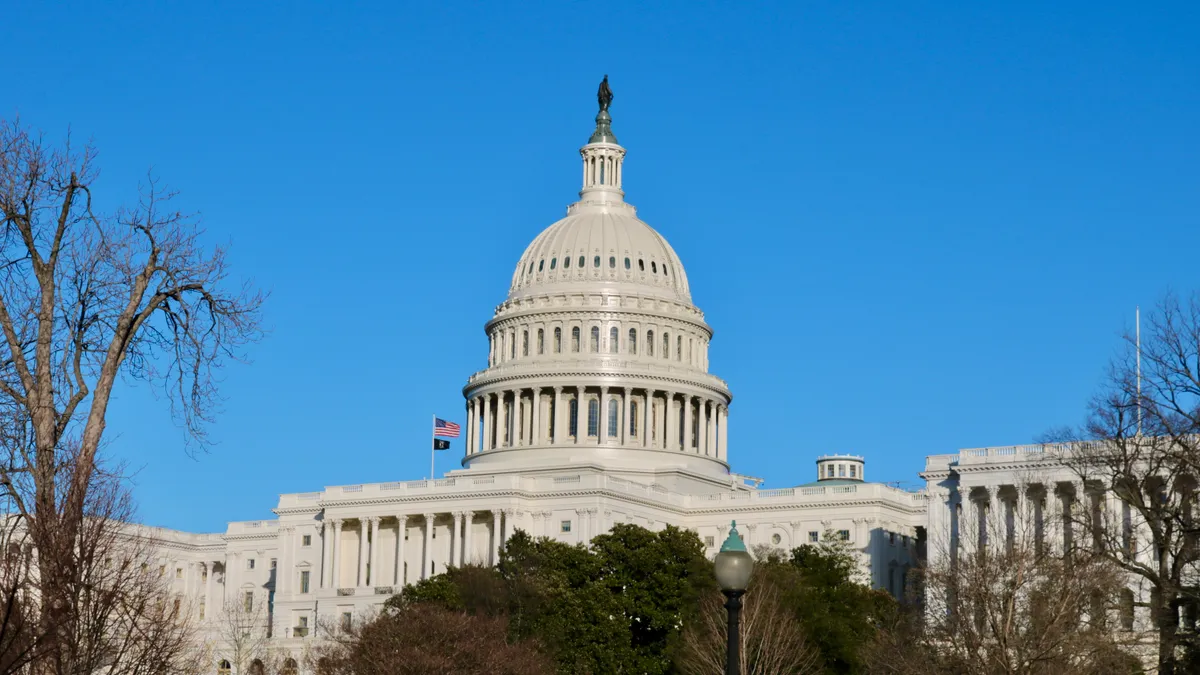Dive Brief:
- Google has sketched out a policy road map to enable global decarbonization of its data centers, calling for rapid deployment of new technologies, markets that value clean energy and policies to empower customer choice.
- The internet giant wants to operate on 24/7 clean energy by 2030, and believes that because of its size and scope, it also has a responsibility to enable others to do the same. "All corporations have a role to play," Caroline Golin, Google's global head of energy market development and policy, said Wednesday at the BNEF Summit.
- Congress is back in session this week, and there is talk of reviving some portions of President Biden's Build Back Better agenda. Google's policy road map calls for clean energy tax incentives that could be considered.
Dive Insight:
All corporations have a role in the clean energy transition, but because of Google's size it has a chance to blaze a trail for others, said Golin.
"For those of us that have the political capital, the physical capital, the voice to drive this needle forward, we need to be even more aggressive than those that don't have the agency or don't have the ability," she said. To that end, Google published its "policy roadmap" on April 14.
The company is making progress. At the end of last year, Google reported it had five data centers operating "near or above 90%" 24/7 clean energy, and in 2020, the company reached 67% round-the-clock carbon-free energy across all its data centers, up from 61% in 2019.
Google is not the only tech company adding large amounts of clean power. Amazon says it is on track to meet its 100% clean energy goal five years ahead of its original 2030 target. On Wednesday, the online retailer announced it had secured 37 new renewable energy projects totaling 3.5 GW, expanding the company's renewable energy portfolio by 30%.
Google wants to see U.S. lawmakers pass new technology-neutral tax incentives, along with standalone credits for energy storage and high-voltage transmission lines. One such incentive, the Energy Sector Innovation Credit, would encourage new carbon-free technologies and then phase down support as they scale up.
While Democrats failed to advance the Build Back Better agenda in 2021, there is interest in reviving some energy policies and the bipartisan Energy Sector Innovation Credit still has life. Rep. Tom Reed, R-N.Y., mentioned it as a priority on Tuesday at a local town hall meeting according to Erie News Now. Lawmakers have been on a "state work" period, but return to Washington, D.C., this week. Senate Majority Leader Chuck Schumer, D-N.Y., has indicated lawmakers may "pick up pace" on Biden's agenda when they are back in session.
Tax policy is a key to advancing nascent energy technologies, said Golin. "We're looking at everything under the sun, including long-duration storage, hydrogen, carbon capture, next generation nuclear, existing nuclear, and the like."
Google also wants to see the expansion of competitive energy markets in the United States and globally. "We've got to reform them so they get the right market signal so that these new technologies can scale," Golin said.
Independent, regional and competitive electricity markets "operating flexibly within integrated transmission systems are the best way to reliably increase the deployment of clean energy onto the grid while reducing costs overall for consumer," according to Google's legislative road map.
About 80% of bilateral corporate clean power purchase agreements in the United States have occurred in competitive wholesale markets, according to the paper, making it clear that approach encourages renewables, according to Google.
"These purchases by companies have accelerated the dramatic cost declines in renewable energy," the paper says. "By contrast, the Southeastern United States, which lacks a regional, competitive wholesale market for generation, offers some of the highest retail electricity bills in the country, and has been slow to adopt clean energy."
Customer access is also key, said Golin. "Every customer should be able to go to market and purchase clean energy and they should have agency in doing that," she said. The paper calls on policymakers to develop frameworks that permit businesses and individuals to directly purchase clean energy.
"Everyone needs to get involved in changing the policy and the systems," Golin said. "We don't have a pathway to decarbonize the future unless we do that."















